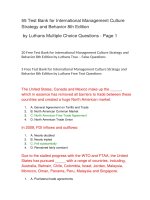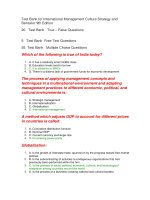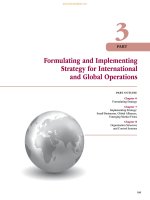International management behavior, seventh edition maznevski, martha, lane, henry w
Bạn đang xem bản rút gọn của tài liệu. Xem và tải ngay bản đầy đủ của tài liệu tại đây (1.29 MB, 306 trang )
“Those familiar with previous editions of this excellent text will find the 7th edition
extensively revised. However, the focus on the human element of managing effectively
across national and cultural contexts, a highlight of previous editions, has been maintained. This new edition provides immediate and practical guidance for managers. This
application to practice, drawn from extensive research and the experiences of managers, is what sets this book apart. Anyone interested in knowing how to function effectively in a global business environment should keep this volume close at hand.”
David C. Thomas, PhD, Professor of International Business,
Australian School of Business, Author of
Cross-Cultural Management: Essential Concepts
“Professors Harry Lane and Martha Maznevski are two of the most skilled, experienced,
and insightful cross-cultural educators of our time. The seventh edition of International
Management Behavior is subtitled Global and Sustainable Leadership, a topic that resonates
well with what I consider important to convey to a student of today. Lane and Maznevski
epitomize the subtitle by leading the way in sharing their teaching. We are provided
with meaningful models which not only illustrate the text but are also bound to generate exciting discussions in class. This book is not to be missed!”
Lena Zander, Professor, Uppsala University, Sweden
“I recall when I encountered the first edition of International Management Behavior. It was
like a cool drink on a hot day. The world suddenly seemed a better place. As I review
the 7th edition, I marvel that the book still packs a punch and maintains what made it a
stand-out book from the start — its overwhelmingly positive view of the world and of the
potential for skilled managers to make a profound and positive difference. The changes
in this edition are both needed and welcome; the world is rapidly changing and this edition has responded in kind. Anyone who absorbs and applies the wisdom between its
covers will be well prepared to take their place among the best global managers.”
Allan Bird, Brodsky Professor in Global Business,
D’Amore-McKim School of Business, Northeastern University
“Since its first publication in 1988, International Management Behavior has been an indispensable resource for faculty teaching a wide variety of courses in international management, cross-cultural management and international organizational behavior. IMB
has a number of strengths. It was one of the first texts to take a process and interactive approach to international management behavior. Its ‘MBI--Map--Bridge--Integrate
framework’ foresaw research that was to come much later and has stood the test of
time. The fact that its authors are active researchers as well as closely engaged with
the world of practice makes this text current, rigorous and relevant. I recommend it
unreservedly!”
Nakiye A. Boyacigiller, Professor of Management, Sabanci University,
Istanbul, Turkey, President-elect, Academy of International Business
International Management Behavior
International Management
Behavior
Global and Sustainable Leadership
Seventh Edition
Henry W. Lane
Professor of International Business and Strategy, D’Amore-McKim School of
Business, Northeastern University, and Professor Emeritus, Richard Ivey School of
Business, University of Western Ontario
Martha L. Maznevski
Professor of Organizational Behavior and International Management, IMD,
Lausanne, Switzerland
This edition first published 2014
© 2014 Henry W. Lane and Martha L. Maznevski
First edition published 1988 by Nelson Canada
Second edition published 1992 by PWS-Kent Publishing Company
Third, fourth and fifth editions published 1997, 2000, 2006 by Blackwell Publishing Ltd
Sixth edition published 2009 by John Wiley & Sons Ltd
Registered office
John Wiley & Sons Ltd, The Atrium, Southern Gate, Chichester, West Sussex, PO19 8SQ, United Kingdom
For details of our global editorial offices, for customer services and for information about how to apply for permission to
reuse the copyright material in this book please visit our website at www.wiley.com.
The right of the authors to be identified as the authors of this work has been asserted in accordance with the Copyright,
Designs and Patents Act 1988
All rights reserved. No part of this publication may be reproduced, stored in a retrieval system, or transmitted, in any form
or by any means, electronic, mechanical, photocopying, recording or otherwise, except as permitted by the UK Copyright,
Designs and Patents Act 1988, without the prior permission of the publisher.
Wiley publishes in a variety of print and electronic formats and by print-on-demand. Some material included with standard
print versions of this book may not be included in e-books or in print-on-demand. If this book refers to media such as a CD or
DVD that is not included in the version you purchased, you may download this material at . For
more information about Wiley products, visit www.wiley.com.
Designations used by companies to distinguish their products are often claimed as trademarks. All brand names and product
names used in this book are trade names, service marks, trademarks or registered trademarks of their respective owners. The
publisher is not associated with any product or vendor mentioned in this book.
Limit of Liability/Disclaimer of Warranty: While the publisher and author have used their best efforts in preparing this book,
they make no representations or warranties with respect to the accuracy or completeness of the contents of this book and
specifically disclaim any implied warranties of merchantability or fitness for a particular purpose. It is sold on the understanding that the publisher is not engaged in rendering professional services and neither the publisher nor the author shall be
liable for damages arising herefrom. If professional advice or other expert assistance is required, the services of a competent
professional should be sought.
Library of Congress Cataloging-in-Publication Data is available
A catalogue record for this book is available from the British Library.
ISBN 978-1-118-52737-5 (pbk) ISBN 978-1-118-78879-0 (ebk)
ISBN 978-1-118-78878-3 (ebk)
Set in 10/12 ITC New Baskerville Std by MPS Ltd, Chennai, India
Printed in Great Britain by TJ International Ltd, Padstow, Cornwall, UK
Dedication
To Joe DiStefano, who inspired and empowered our excitement for
cross-cultural journeys. If we make a difference, it is in large part because
you made a difference to us.
To all the friends who have helped me learn about their cultures, and my own.
Henry (Harry) W. Lane
To Julianna, Katie, Andrea and Hadley, to help them inspire the next generation.
Martha L. Maznevski
Contents
Acknowledgments
xi
Introduction
1
Part 1
5
Chapter 1
The Global Manager
Part 2
7
31
Chapter 2
Understanding Culture: Through the Looking Glass
33
Chapter 3
Interpersonal Skills for International Management:
The MBI Model for High Performance
71
Managing Global Teams and Networks
97
Chapter 4
Part 3
121
Chapter 5
Executing Global Strategy
123
Chapter 6
Talent Management: Selecting and Developing Global Managers
169
Chapter 7
Managing Change in Global Organizations
191
Part 4
215
Chapter 8
Competing with Integrity in Global Business: Personal Integrity
217
Chapter 9
Competing with Integrity in Global Business: Corporate
Sustainability
255
Index
281
Acknowledgments
The seventh edition of this book has involved a major revision of material from previous
editions.
With Professor DiStefano’s retirement and absence from this edition, Professors Lane
and Maznevski start by acknowledging his historical contribution to this book and to
their careers. In 1975, Professor DiStefano interviewed Professor Lane who was a
doctoral candidate at the Harvard Business School, and recruited him to Canada. He
became a colleague, co-author, and friend. In 1974 at the Ivey Business School (at the
time the Western Business School), Professor DiStefano started one of the first crosscultural courses anywhere, which became the genesis of this book. He was also the Chair
of Professor Maznevski’s Ph.D. thesis committee. In January 2000, Professor DiStefano
joined IMD in Lausanne, Switzerland, and recruited Professor Maznevski to IMD in
2001.
Another person at the University of Western Ontario who became a colleague,
co-author, and friend, was Professor Don Simpson. He deserves special recognition for
introducing Professor Lane to Africa and helping him begin his “voyage of discovery”
into the reality of functioning in other cultures and doing business internationally.
Professors Lane and Maznevski have appreciated the support for their work on
international business shown by their colleagues and research associates over the years
at the Ivey Business School, Northeastern University, University of Virginia, and IMD.
Both of us owe a special debt to our professors, colleagues, and friends who shaped our
interests and knowledge at Ivey. We are grateful to: Deans J. J. (Jack) Wettlaufer, C. B.
(Bud) Johnston, Adrian Ryans, and Larry Tapp; Professors Jim Hatch, Terry Deutscher,
and Ken Hardy; the directors of Research and Publications at the Ivey Business
xii
ACKNOWLEDGMENTS
School; and especially the donors of the Donald F. Hunter professorship (a Maclean
Hunter endowment) and the Royal Bank professorship, which provided extra time for
Professors Lane and DiStefano to undertake much of the initial work in developing this
text. We all also recognize the special contribution and mentorship of the late Professor
Al Mikalachki who taught us so much about change.
After the third edition Professor DiStefano moved to Hong Kong to launch the Ivey
EMBA program there and acknowledges with thanks Ivey alumnus, Dr Henry Cheng,
whose financial and personal support were so critical to the success of this effort and to
the deepening of Professor DiStefano’s understanding of Hong Kong and China.
In 1994, Professor Lane assumed responsibility for Ivey’s Americas Program and that
same year he began working with IPADE in Mexico and is very appreciative of the
wonderful colleagues and friends he has made there over 20 years who have not only
contributed to his education about Mexico and Latin America, but made it enjoyable to
spend time there learning. In September 1999, Professor Lane moved to Northeastern
University as the Darla and Frederick Brodsky Trustee Professor in Global Business.
Professor Lane is grateful for their support and friendship.
In 1994, Professor Maznevski moved from Ivey to the McIntire School of Commerce
at the University of Virginia. She thanks her colleagues there, in particular Dean Carl
Zeithaml. The commitment of the school to making its programs global provided
substantial support for her involvement in developing material for this book. Dean
Zeithaml sponsored, both financially and with his enthusiasm, the first ION conferences
and the genesis of a great network of colleagues.
In 2001, Professor Maznevski moved to IMD, and her learning and this book have
been greatly influenced by her experiences there. She thanks her colleagues for
their collaboration and learning adventures. As Program Director for large general
management programs, of the full-time MBA, and of many programs for companies,
she worked with senior executives from around the world, and accompanied them on
their global development journeys.
To this list of acknowledgments we need to add a large number of people and
institutions from around the world who have broadened and informed our experience:
managers in both the public and private sectors; colleagues at other universities and
institutes; companies who have provided access to their operations for the purpose of
writing cases; and a number of former students and research assistants who worked
with us to develop material for this and previous editions. Among the former research
assistants, a special note of thanks is due to Professor Bill Blake of Queen’s University
and to Professor Lorna Wright of York University. We would also like to thank David
Ager, Dan Campbell, Celia Chui, Karsten Jonsen, and David Wesley for their substantial
contributions. Other previous doctoral students who contributed to the intellectual
tradition in international business at Ivey and to our learning, included Paul Beamish,
Neil Abramson, Shawna O’Grady, Terry Hildebrand, Professor Iris Berdrow of Bentley
University, Sing Chee Ling, and Jonathan Calof.
ACKNOWLEDGMENTS
xiii
The restructuring that has taken place in the publishing industry adds considerably to
this list of acknowledgments. A series of acquisitions and reorganizations has led to our
experience with six publishers and five editors during the writing of the six editions.
Our sincere thanks go to Joerg Klauck who was at Methuen, Ric Kitowski who was at
Nelson Canada, Rolf Janke who was at PWS-Kent and then Blackwell, and Catriona King
at Blackwell. All were strong believers in, and advocates for, this book. Additionally,
Rosemary Nixon who was at Blackwell has also been a strong supporter of our work in
this and other books. When Wiley acquired Blackwell, Rosemary moved to Wiley and
we are delighted to be continuing our relationship with her at Wiley. We also express
our appreciation to colleagues who have provided the publishers, and us, with helpful
critiques. To Nick Athanassiou, Bert Spector. Chris Robertson, and Jeanne McNett
and Andy Savitz we say a special thanks for the reviews, suggestions, and editing which
shaped this, and earlier editions.
Students and managers who have worked with our materials and colleagues who
have adopted our book and have written to us with thanks and suggestions, have all
helped us and others learn. To them we also add our gratitude. Professor Lane would
acknowledge, in particular, Professors Nick Athanassiou, Sheila Puffer, Alexandra Roth,
David Wesley and Tricia McConville who have used this book at Northeastern and the
executives who have shared their experiences with us or have facilitated access to case
situations: Ken Clark, Gail Ellement, Ted English, Charles Forsgard, Astrid Nielsen,
Philipp Röh, and Ron Zitlow. Professor Maznevski thanks all the many executives on
programs at IMD that have shared their stories and challenges.
We both warmly thank our friends and colleagues at ION, the International
Organizations Network. This group has greatly facilitated and inspired our work, helped
us make new friends and create new knowledge, and is always fun.
Last, but hardly least, we thank our families who have supported our learning and
the publishing of what we have learned. This has meant time away from home, time
spent alone writing, and time and energy devoted to the many visitors and friends
from around the world who have shared our homes. All have been critical to our
development. Our spouses, Anne and Brian have been more than patient; they have
contributed significantly to our understanding and commitment, as have our children
and grandchildren. We thank them all for their love and assistance. Notwithstanding
this lengthy list of personal acknowledgments, we close with the usual caveat that we
alone remain responsible for the contents of this book.
H. W. Lane
Boston, MA
M. L. Maznevski
Lausanne, Switzerland
May 2013
I NTRODUCTION
The real voyage of discovery consists not in seeking new landscapes, but in having new eyes.
—Marcel Proust
This book is for managers like Lars, a senior German manager who has worked and
lived in many countries and is now in charge of operations at a multinational technical
firm, working with his teams to develop and implement global strategies; like Magdi,
a senior Lebanese manager who has also worked and lived in many countries and is
now in charge of an important, but challenging, country organization for a global
multinational company; and like Amanda, an American senior manager with a great
track record in new product development and marketing at many important Silicon
Valley firms, now with direct responsibility for international operations.
The book is also for young managers like Rachna, an Indian now in Europe, globally
sourcing service contracts for a US-based multinational; like Jonatas, a Brazilian now in
the Middle East, optimizing supply chain for a Europe-based specialty chemicals firm
selling its product to Asia; like Rich, a Canadian who returned to his home country after
working abroad, to innovate new practices in the oil industry; and like Kathie, just starting
her career, intrigued about international management and eager to learn what it entails.
It’s also for people like Jemilah, Ed, Feena, Judy and Jim: senior leaders in global NGOs
who are actively trying to help the world while simultaneously revolutionizing their
industry to make aid more effective. And it is for Jesper, Mahoto, Ernest and Saskia, young
managers creating innovative ways to combine aid, development, and entrepreneurship
to help people help themselves in countries with developing economies.
The book is also for people like Josefine, Mads, Veronica, and other senior leaders in
human resources responsible for attracting, assessing, developing, and enabling all the
people who manage their organizations internationally.
2
INTERNATIONAL MANAGEMENT BEHAVIOR
This book is not just a book about global business. It is about people who conduct business –
and manage other types of organizations – in a global environment. It discusses and explores
typical situations that managers encounter: the problems and opportunities; the
frustrations and rewards; the successes and failures; the decisions they must make and
the actions they must take.
Global business is not an impersonal activity, and it should not be studied solely in an
impersonal way. It is important to understand trade theories; to be able to weigh the
pros and cons of exporting versus licensing; or to understand the advantages of a
joint venture versus a wholly-owned subsidiary. But, eventually theory must give way to
practice; strategizing and debating alternatives must give way to action. Working globally
means interacting with colleagues, customers, and suppliers from other countries to
achieve a specific outcome. We focus on these interactions, on getting things done with
and through other people in an international context.
DEVELOPING INTERNATIONAL MANAGERS: RESEARCH-GROUNDED,
PRAGMATICALLY-TESTED
We have developed, refined, and tested the perspectives in this book for over 40 years
with undergraduates, graduate students, and practicing executives of all levels around
the world. Combining conceptual knowledge and contextually based skill-building
provides an effective learning package. In addition to drawing on the research of
others, we have conducted our own research on the issues and skills relevant to
international management, as well as how best to train global managers.
Management focus. We take a problem-solving approach to international business.
International business activities are complex situations in which both business and
cultural factors are often simultaneously embedded. The skills needed to cross
boundaries cannot be isolated from business realities, and appreciating various and
multiple influences on behavior can make a difference in outcome and performance.
Behavioral focus. The human element in managing effectively across cultures is
just as important as, and sometimes more important than, the technical or functional
elements. However, most managers have developed stronger technical or business skills
than boundary-spanning interpersonal and cultural skills. They need to complement
these strong technical backgrounds with the behavioral skills; if they don’t, they may
never get the opportunity to use the business or technical skills.
Process focus. Related to the behavioral orientation is a process orientation –
behaving, interacting, learning, and moving forward to meet objectives. This
perspective is an important contributor to success in a global market. In other words,
leading well in an international setting is not just about having the right characteristics
or competences, it’s about the dynamics of knowing how to adapt quickly and
effectively. Often, good international management is less about “finding a solution or
making a decision” and more about “identifying and embarking on a process.”
INTRODUCTION
3
Intercultural focus. The material in this text focuses primarily on the interaction
between people of different cultures in work settings. This intercultural orientation is
distinct from a comparative approach, in which management practices of individual
countries or cultures are examined and compared. We will often report on cultural
comparisons, but we will focus on what happens at the intersection. This is the interface
that provides both the greatest challenges and the most interesting opportunities.
Culture-general focus. This book is intended for a wide variety of managers and
international staff who must function effectively in a global environment; therefore,
we do not concentrate deeply on particular cultures, countries or regions. A culturegeneral perspective provides a framework within which country-specific learning can
take place more rapidly as necessary. It helps to know what questions to ask and how
to interpret the answers received when conducting business globally or helping others
to do the same. It helps the learner become more effective at learning and adapting
to other cultures. We do provide specific examples of cultures, countries and regions:
not enough to take the place of in-depth culture-specific training for people who are
assigned to a particular place, but enough to enhance the impact of that training.
OUTLINE OF THE BOOK: FOLLOWING THE CHALLENGES AND OPPORTUNITIES
The four parts of this book follow the main categories of challenges and opportunities
we see international managers experiencing most frequently.
Part 1 is made up of Chapter 1, The Global Manager. This chapter explores the role of
people who manage others in a global environment, and what makes it different from
“regular” management. It introduces a global mindset, a global leadership competences
model, and a set of principles for leading. These three elements set the organizing
framework for the rest of the book.
Part 2 consists of three chapters that look at the individual and interpersonal sides of
global management. Chapter 2 discusses culture and its effect on people and their
behavior, Chapter 3 describes a model for interacting effectively across cultures, and
Chapter 4 focuses on global teams and networks.
Part 3 moves the discussion from the individual to the organizational level. Chapter 5
focuses on strategy execution in a global context. Chapter 6 examines the challenge
of complexity facing global managers and issues in recruiting and developing the people in this talent pool. Chapter 7 provides guidance on managing change in global
organizations.
Part 4 has two chapters on competing with integrity in global business. Chapter 8 focuses
on ethics at an individual level and Chapter 9 looks at corporate sustainability issues.
The chapters combine our own research and experience and that of many others.
This is not a typical textbook in that we do not provide a review of all the research in
4
INTERNATIONAL MANAGEMENT BEHAVIOR
the field. Other resources do that well. We focus here on the research that provides
the most immediate practical guidance for managers, and present it in ways that have
proven to be helpful for practice. We provide many examples throughout the book to
help readers see how others have applied the lessons, and generate ideas for applying
the ideas and behaviors themselves. Most of our examples come directly from the experience of managers we’ve worked closely with, and we’ve tried to capture the flavor, feeling, and tempo of these people and the places in which they live and work. They may
not be as recognizable as leaders who capture headlines in the press, but we provide
more behavioral and reflective insights. We find they provide great role models.
In this edition, we have not provided full-length teaching cases. If you are a professor
using this book for a class or a consultant using it to develop others, please see our website www.wiley.com/go/lane7e for sample syllabi, annotated suggestions for teaching
cases, and resources for teaching and developing global leaders.
Globalization means that one does not have to travel to another country to be exposed
to situations of cultural diversity. For example, consider a manager in Boston who works
for Genzyme which is one of the world’s leading biotech companies. This company was
founded in Boston in 1981 and was acquired by Sanofi SA from France in 2011. Now the
American manager may be frequently travelling to France or interacting with French
managers when they come to Boston. This same manager possibly interacts with a number of other local Boston companies that are also now foreign-owned. He or she may
have an account with Citizens Bank (owned by the Royal Bank of Scotland Group plc)
or Sovereign Bank (owned by Santander from Spain); purchase insurance from John
Hancock (owned by Manulife Financial of Canada); and buy groceries from Stop &
Shop (owned by Royal Ahold NV of the Netherlands). And managers from these companies are also likely to experience working with their Scottish, Canadian, Spanish and
Dutch counterparts.
In countries with long histories of immigration, such as Canada, the United States, and
Brazil, there is considerable diversity within the domestic workforce and many managers
experience working with cultural diversity as part of their daily routine. Managers in all
of these countries find the material in this book is also applicable in these situations and
has been useful – without them ever having to leave their home base.
FOCUS ON THE VOYAGE
This book is based on the philosophy that learning is a life-long, continuous process.
Rather than provide an illusion of mastery, we hope it stimulates and facilitates even
more learning about other cultures and how to work effectively with others. For
some readers, the material in this book may represent a first encounter with different
cultures. Other readers may have been exposed to different cultures through previous
courses or personal experience. For those with prior exposure to other people and
places, the journey continues with a new level of insight. For those without prior
experiences, welcome to an interesting journey!
P ART
1
C HAPTER
1
The Global Manager
It has become cliché to say that today’s managers, wherever they are, must be internationally-minded. We have been saying it since the first edition of this book in 1988, and
it seems to be more imperative with each year. In the twenty-first century, being a global
leader is no longer a nice-to-have capability, it is a must-have for those who want to create value for their organizations. Recently we asked a group of executives from several
countries, “How important is it for you to be a global leader – a leader who has expertise working effectively across countries?” Here are some typical responses:
Christine, head of a key product division in an industrial product firm’s largest
country market, Germany: “My customers are all in Germany and so is my team,
so you would think my job is all in Germany. But our company is headquartered in
Scandinavia and our plants are in several different locations around Europe. When
we have challenges serving our customers, the people I need to work with are mostly
outside of Germany and those are the interactions that make the biggest difference
in my business. Maybe even more important, my new ideas come from outside of
Germany. The German market is mature, saturated, we and the customers all know
what to expect. It’s when I work with people in the international arena that I learn
how to build my business better within Germany.”
Ho Yin, corporate director of human resources of a Singapore-based conglomerate’s utility businesses: “You might expect that a business involved in generating, distributing and retailing electrical power is fundamentally local. But as we extend our
reach to Australia, India, Southeast Asia and China, we need to identify and adopt
the best practices in the industry worldwide. Regulators expect us to provide reliable service at competitive prices. To do this we need managers beyond our solid base
of technical experts; people who are experienced at dealing with ideas and people
from many countries and cultures, and who can lead in demanding circumstances in
8
INTERNATIONAL MANAGEMENT BEHAVIOR
many different countries. Finding and developing such people is perhaps our biggest
challenge.”
Jesper, a Swedish social entrepreneur working in Kenya: “My not-for-profit provides
solar-powered lamps to off-grid rural areas in Kenya to empower children to study.1
My funders mostly come from the developed world, and I have close partnerships
with colleagues in places like the US and Switzerland – individuals and companies –
for this funding. The quality and price of the lamps is critical, so we ran an extensive
global search and ended up with lamps sourced from China. The other part of my
job is helping new investors come to Africa, both through investment funds I help
to run, and providing advice for ethical business entry. My job is clearly global and
I love that. The opportunities are enormous when you can bring the world together
to address local challenges. It’s clear to me that others are seeing those opportunities too.”
Leading internationally is more complex today than it was a generation ago. At that
time, “international managers” were a relatively small subset of managers, those who
journeyed away from home as expatriates to do exciting things. They experienced
hardship from (sometimes unexpected) foreign conditions, and rewards from generous expatriate compensation packages as well as fulfilling their need for growth and
adventure.
With changes in arenas such as technology, finance, political systems, business models,
air travel, and the media, most managers today work across national borders. Having
a successful management career in any kind of business today requires effective international navigation. Moreover, international management today is rarely about just
going from one culture to another. Typical international managers, like the executives
quoted above, may travel to many different countries in any year, and frequently work
with people from many different cultures at the same time. To be successful, they cannot simply learn about another culture and place, and adapt. The dynamics are much
more complex.
In this chapter we discuss how the forces in the international environment are shaping the characteristics needed by global leaders. We explore what makes a leader’s task
more or less global, and we comment on the relationship between management and
leadership. Then we review the characteristics, competences, knowledge, and skills that
effective global managers need, highlighting the global mindset and competences. The
last section of this chapter addresses how to become an effective global leader: how to
develop the global mindset and competences, and some principles for navigating well in
global complexity. We conclude by showing how the different sections of this book can
help you on your personal development journey.
More and more, managers are dealing with different cultures. Companies are going global, and
teams are spread across the globe. If you’re head of engineering, you have to deal with divisions in
Vietnam, India, China or Russia, and you have to work across cultures. You have to know how
to motivate people who speak different languages, who have different cultural contexts, who have
9
THE GLOBAL MANAGER
different sensitivities and habits. You have to get prepared to deal with teams who are multicultural,
to work with people who do not all think the same way as you do.2
As we stand at the dawn of the 21st century, we must ask ourselves if we can truly manage ourselves
cross-culturally. This is the principal question. A decade ago, culture was not a particular issue, but
the more we advance, the more managing people of different cultures and beliefs becomes the benchmark of an efficient company. 3
Carlos Ghosn, Chairman and CEO of Nissan Motor Company
and Chairman and CEO of Renault
GLOBALIZATION: THE SETTING FOR INTERNATIONAL MANAGEMENT BEHAVIOR
What is globalization? The Stanford Encyclopedia of Philosophy states that “the term ‘globalization’ has quickly become one of the most fashionable buzzwords of contemporary political
and academic debate” and most often is nothing more than a synonym for the spread of classical liberal, “free market” economic policies; the spread and dominance of “Westernization,”
or even “Americanization” of political, economic, and cultural life; and the rise of new
information technologies such as the Internet – all of which are bringing the world closer
together.4 And there is often an unarticulated assumption that globalization is good.
We should remember, however, that globalization is a process and not a destination. In
The Lexus and the Olive Tree, Thomas Friedman pointed out that in addition to politics,
economics, technology, and culture, globalization involves issues of the environment
and national security. Terrorism and pollution also have “gone global” and there can
be negative aspects of globalization as well as positive, the “good and bad globalization”;
and globalization can spread evil as well as good.5 On the negative side there are global
criminal activities such as drugs and money laundering while on the positive there is
the reduction of poverty and the increase of living standards. The Occupy movement
focuses on the inequality associated with globalization, raising the voice of, in their
words, “the other 99%” who are disenfranchised by globalization.6 Therefore we must
be specific when we discuss globalization – the “globalization of what?”7
There is also an implicit assumption that globalization and global organizations are new
phenomena. By some accounts, globalization is as old as mankind and began when people started migrating out of Africa.8 Globalization is an historical process: “Traveling
short, then longer distances, migrants, merchants, and others have always taken their
ideas, customs, and products into new lands. The melding, borrowing, and adaptation
of outside influences can be found in many areas of human life.”9
The basic feature of globalization is that people, countries, and organizations all around
the world have become more interdependent. More activities affecting more people’s
lives have become more interdependent than ever before. In this book we focus primarily on the economic dimension of globalization and on companies that operate in many
countries around the world and that attempt to integrate their global activities.









